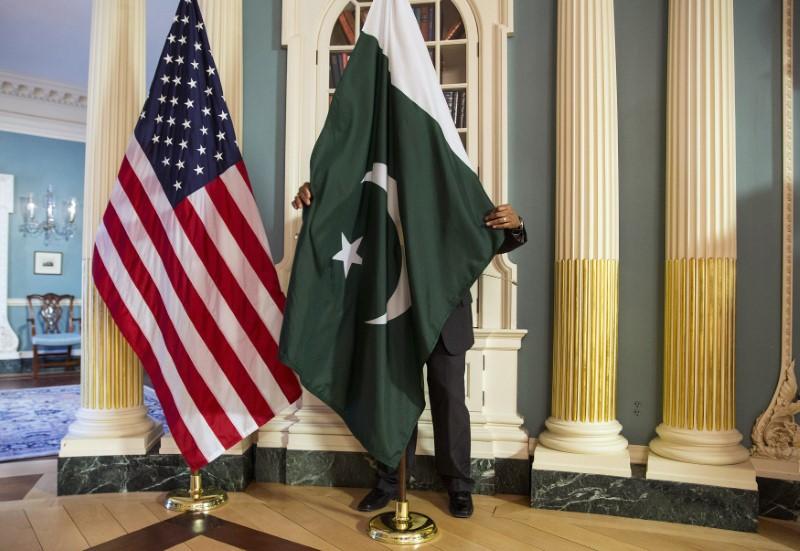Pakistan could face US aid cuts over human trafficking
ISLAMABAD/WASHINGTON: The Trump administration is warning Pakistan it could lose US civilian aid worth tens of millions of dollars this year if Washington finds that the South Asian nation has not done enough to combat human trafficking, US officials said.
An aid cutback would deal a fresh blow to US-Pakistan relations following President Donald Trump’s suspension in January of some $2 billion in US security assistance over what Trump said was Islamabad’s failure to crack down on Afghan insurgent sanctuaries used for attacks into Afghanistan.
A large portion of US civilian aid - $265 million in 2017, according to a source at the US Embassy in Islamabad – could be withheld if the State Department puts Pakistan on a list of worst global offenders in human trafficking in an annual report due out in June.
The funding is relatively modest for the size of Pakistan’s economy. But Islamabad could suffer a heavier jolt if Washington also decides to oppose new assistance from international financial institutions such as the International Monetary Fund and the World Bank.
These are all sanctions that the United States, under federal law, can impose on any country receiving the lowest grade on human trafficking unless Trump issues a full or partial waiver. He did so for most countries on last year’s blacklist, following a pattern set by recent predecessors who were especially lenient on US allies and partners.
By making good on its threat against Pakistan, the Trump administration would raise questions about whether it was using the Trafficking in Persons (TIP) report to pressure Islamabad to do more on counter-terrorism.
The report is not supposed to be influenced by other geopolitical considerations, but human rights groups accused the Trump administration last year, and the Obama administration before it, of sometimes prioritizing economic and security interests over human trafficking concerns.
Pakistani Interior Minister Ahsan Iqbal told Reuters the country has “taken very stringent steps” against human trafficking and the issue “should not be used for political means to pressurize countries.”
A senior Trump administration official said no decision on the ranking has been made, but that Pakistan, long an uneasy US ally, has been told it can avoid a lower ranking - and a possible aid cut - only “if we see them making sincere efforts to address the problems that have been raised.”
The US official, speaking on condition of anonymity, denied any link between Pakistan’s cooperation with Trump’s strategy to force the Afghan Taliban into peace talks and the possible loss of US civilian assistance, stressing that any TIP decision would be based solely on Islamabad’s human trafficking record.
The State Department declined comment, except to cite the penalties available under the US anti-human trafficking law.
Pakistan has long rejected US accusations that it provides Afghan Taliban and allied Haqqani network militants with sanctuaries from which they attack the Kabul government and U.S.-led foreign forces in Afghanistan.
CIVILIAN AID HANGS IN BALANCE
Future civilian aid hinges on Pakistan’s rating in the State Department’s 2018 TIP report, an assessment of how more than 180 countries and territories are fighting human smuggling, modern slavery and related issues like child soldiers.
This would trigger the suspension of civilian assistance, except for humanitarian and trade-related aid, unless Trump, who has been stridently critical of Pakistan, waives the penalties. A Tier 3 rating assesses that a country does not comply with minimum U.S. standards against human trafficking.
Pakistan has struggled to eradicate bonded labor practices, especially in dirty brick kilns where children often work.
Iqbal said Pakistan would soon enact tougher laws. He did not confirm, however, that Washington had warned his government about potential aid cuts related to human trafficking.
“This cause is much more valuable than billions of dollars in aid because this is about human dignity,” he told Reuters. “There has to be more understanding of the efforts that countries like us are doing.”
Pakistani officials dismissed the impact of a loss of U.S. civilian aid, most of which flows through non-governmental organizations, on the country’s growing economy of nearly $300 billion.
Still, they have expressed concern that Washington wants international bodies to punish Pakistan for not heeding Trump’s South Asia security agenda.
In February, urged by the United States and European powers, the Financial Action Task Force, a global money-laundering watchdog, placed Pakistan on a terrorist financing watchlist.






